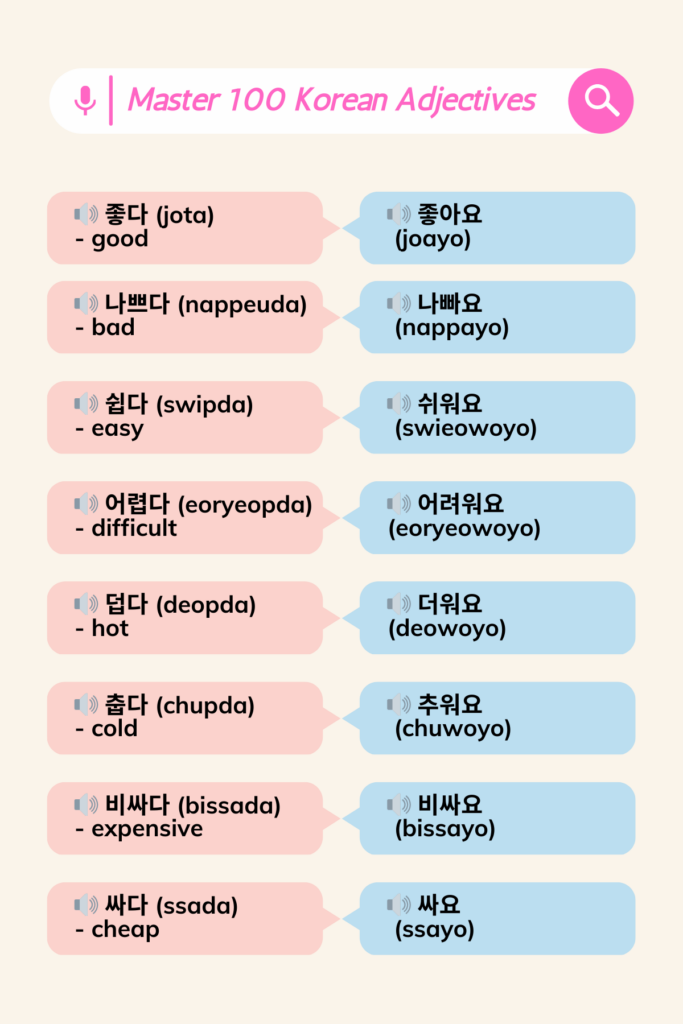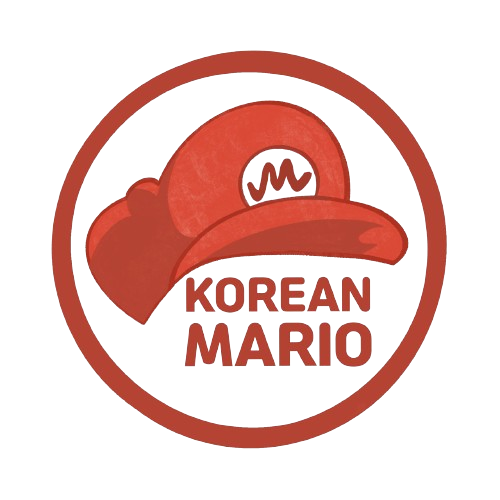
Learning Korean adjectives is essential for building your vocabulary and improving your ability to describe people, places, and things. Here are 100 of the most common and easy-to-use Korean adjectives, complete with romanization and practical examples.
Here’s the breakdown of the conjugation rules applied to these adjectives:
- Basic Rule for Conjugation:
- Remove the 다 (da) ending from the dictionary form.
- Add 아요 (ayo) if the last vowel of the stem is ㅏ or ㅗ.
- Add 어요 (eoyo) if the last vowel of the stem is not ㅏ or ㅗ.
- Irregular Conjugation:
- ㅂ irregular: For adjectives ending in ㅂ, the ㅂ changes to 오 and then 아요 is added, making 워요 (woyo). Examples: 쉽다 (쉬워요), 덥다 (더워요), 춥다 (추워요).
- 르 irregular: For adjectives ending in 르, the 르 changes to 라 and then becomes 라요, which then changes to the appropriate form. Examples, it’s 빨라요 (ppalrayo).
This should help with the conjugation of these common adjectives!
Most Common Korean Adjectives
| 🔊 작다 (jakda) – small | 작아요 (jakayo) |
| 🔊 크다 (keuda) – big | 커요 (keoyo) |
| 🔊 높다 (nopda) – high | 높아요 (nopayo) |
| 🔊 낮다 (natda) – low | 낮아요 (najayo) |
| 🔊 길다 (gilda) – long | 길어요 (gileoyo) |
| 🔊 짧다 (jjalbda) – short | 짧아요 (jjalbayo) |
| 🔊 무겁다 (mugeopda) – heavy | 무거워요 (mugeowoyo) |
| 🔊 가볍다 (gabyeopda) – light | 가벼워요 (gabyeowoyo) |
| 🔊 빠르다 (ppareuda) – fast | 빨라요 (ppalrayo) |
| 🔊 느리다 (neurida) – slow | 느려요 (neuryeoyo) |
| 🔊 좋다 (jota) – good | 좋아요 (joayo) |
| 🔊 나쁘다 (nappeuda) – bad | 나빠요 (nappayo) |
| 🔊 쉽다 (swipda) – easy | 쉬워요 (swieowoyo) |
| 🔊 어렵다 (eoryeopda) – difficult | 어려워요 (eoryeowoyo) |
| 🔊 덥다 (deopda) – hot | 더워요 (deowoyo) |
| 🔊 춥다 (chupda) – cold | 추워요 (chuwoyo) |
| 🔊 많다 (manta) – many | 많아요 (manayo) |
| 🔊 적다 (jeokda) – few | 적어요 (jeogeoyo) |
| 🔊 비싸다 (bissada) – expensive | 비싸요 (bissayo) |
| 🔊 싸다 (ssada) – cheap | 싸요 (ssayo) |
| 🔊 조용하다 (joyonghada) – quiet | 조용해요 (joyonghaeyo) |
| 🔊 시끄럽다 (sikkeureopda) – noisy | 시끄러워요 (sikkeureowoyo) |
| 🔊 깨끗하다 (kkaekkeuthada) – clean | 깨끗해요 (kkaekkeuthaeyo) |
| 🔊 더럽다 (deoreopda) – dirty | 더러워요 (deoreowoyo) |
| 🔊 행복하다 (haengbokhada) – happy | 행복해요 (haengbokhaeyo) |
| 🔊 슬프다 (seulpeuda) – sad | 슬퍼요 (seulpeoyo) |
| 🔊 건강하다 (geonganghada) – healthy | 건강해요 (geonganghaeyo) |
| 🔊 배고프다 (baegopeuda) – hungry | 배고파요 (baegopayo) |
| 🔊 목마르다 (mokmareuda) – thirsty | 목말라요 (mokmallayo) |
| 🔊 재미있다 (jaemiitda) – interesting | 재미있어요 (jaemiisseoyo) |
| 🔊 재미없다 (jaemieopda) – boring | 재미없어요 (jaemieopseoyo) |
| 🔊 무섭다 (museopda) – scary | 무서워요 (museowoyo) |
| 🔊 귀엽다 (gwiyeopda) – cute | 귀여워요 (gwiyeowoyo) |
| 🔊 예쁘다 (yeppeuda) – pretty | 예뻐요 (yeppeoyo) |
| 🔊 잘생기다 (jalsaenggida) – handsome | 잘생겼어요 (jalsaenggyeosseoyo) |
| 🔊 못생기다 (motsaenggida) – ugly | 못생겼어요 (motsaenggyeosseoyo) |
| 🔊 똑똑하다 (ttokttokhada) – smart | 똑똑해요 (ttokttokhaeyo) |
| 🔊 멍청하다 (meongcheonghada) – stupid | 멍청해요 (meongcheonghaeyo) |
| 🔊 친절하다 (chinjeolhada) – kind | 친절해요 (chinjeolhaeyo) |
| 🔊 불친절하다 (bulchinjeolhada) – unkind | 불친절해요 (bulchinjeolhaeyo) |
| 🔊 착하다 (chakhada) – nice | 착해요 (chakaeyo) |
| 🔊 배부르다 (baebureuda) – full | 배불러요 (baebulleoyo) |
| 🔊 비다 (bida) – empty | 비어요 (bieoyo) |
| 🔊 나이가 많다 (naiga manta) – old (age) | 나이가 많아요 (naiga manayo) |
| 🔊 젊다 (jeolmda) – young | 젊어요 (jeolmeoyo) |
| 🔊 강하다 (ganghada) – strong | 강해요 (ganghaeyo) |
| 🔊 약하다 (yakhada) – weak | 약해요 (yahaeyo) |
| 🔊 용감하다 (yonggamhada) – brave | 용감해요 (yonggamhaeyo) |
| 🔊 겁이 많다 (geobi manta) – cowardly | 겁이 많아요 (geobi manayo) |
| 🔊 편하다 (pyeonhada) – comfortable | 편해요 (pyeonhaeyo) |
| 🔊 불편하다 (bulpyeonhada) – uncomfortable | 불편해요 (bulpyeonhaeyo) |
| 🔊 졸리다 (jollida) – sleepy | 졸려요 (jollyeoyo) |
| 🔊 바쁘다 (bappeuda) – busy | 바빠요 (bappayo) |
| 🔊 한가하다 (hangahada) – free (not busy) | 한가해요 (hangahaeyo) |
| 🔊 시원하다 (siwonhada) – cool | 시원해요 (siwonhaeyo) |
| 🔊 따뜻하다 (ttatteuthada) – warm | 따뜻해요 (ttatteuthaeyo) |
| 🔊 미안하다 (mianhada) – sorry | 미안해요 (mianhaeyo) |
| 🔊 고맙다 (gomapda) – grateful | 고마워요 (gomawoyo) |
| 🔊 편리하다 (pyeonrihada) – convenient | 편리해요 (pyeonrihaeyo) |
| 🔊 달다 (dalda) – sweet | 달아요 (dalayo) |
| 🔊 쓰다 (sseuda) – bitter | 써요 (sseoyo) |
| 🔊 매콤하다 (maekomhada) – spicy | 매콤해요 (maekomhaeyo) |
| 🔊 상큼하다 (sangkeumhada) – fresh | 상큼해요 (sangkeumhaeyo) |
| 🔊 신선하다 (sinseonhada) – fresh | 신선해요 (sinseonhaeyo) |
| 🔊 부드럽다 (budeureopda) – soft | 부드러워요 (budeureowoyo) |
| 🔊 딱딱하다 (ttakttakhada) – hard | 딱딱해요 (ttakttakhaeyo) |
| 🔊 뜨겁다 (tteugeopda) – hot (temperature) | 뜨거워요 (tteugeowoyo) |
| 🔊 차갑다 (chagapda) – cold (temperature) | 차가워요 (chagawoyo) |
| 🔊 싱겁다 (singgeopda) – bland | 싱거워요 (singgeowoyo) |
| 🔊 깨끗하다 (kkaekkeuthada) – clean | 깨끗해요 (kkaekkeuthaeyo) |
| 🔊 더럽다 (deoreopda) – dirty | 더러워요 (deoreowoyo) |
| 🔊 느긋하다 (neugeuthada) – relaxed | 느긋해요 (neugeuthaeyo) |
| 🔊 긴장하다 (ginjanghada) – nervous | 긴장해요 (ginjanghaeyo) |
| 🔊 화나다 (hwanada) – angry | 화나요 (hwanayo) |
| 🔊 슬프다 (seulpeuda) – sad | 슬퍼요 (seulpeoyo) |
| 🔊 기쁘다 (gippeuda) – glad | 기뻐요 (gippeoyo) |
| 🔊 아프다 (apeuda) – sick | 아파요 (apayo) |
| 🔊 어둡다 (eodupda) – dark | 어두워요 (eoduwoyo) |
| 🔊 부지런하다 (bujireonhada) – diligent | 부지런해요 (bujireonhaeyo) |
| 🔊 게으르다 (geeureuda) – lazy | 게을러요 (geeulleoyo) |
Learning common and easy-to-use Korean adjectives is an excellent step toward mastering the Korean language. Adjectives play a crucial role in describing the world around us, expressing emotions, and enhancing our conversations. By understanding the dictionary forms and how to conjugate them into the present tense, you can significantly expand your vocabulary and improve your ability to communicate effectively in Korean.
In this blog, we explored 100 of the most frequently used Korean adjectives, complete with their romanization, conjugation, and practical example sentences. From describing physical characteristics like 크다 (keuda) – big, to expressing emotions such as 행복하다 (haengbokhada) – happy, these adjectives are foundational to everyday Korean conversation.
Remember, practice is key to becoming fluent in any language. Try incorporating these adjectives into your daily conversations, writing exercises, or even while watching Korean dramas or listening to Korean music. Over time, you’ll find yourself becoming more comfortable and confident in your ability to describe and express a wide range of scenarios in Korean.
Happy learning, and enjoy your journey to becoming proficient in Korean!

